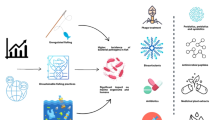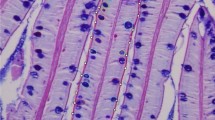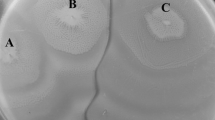Abstract
Studies about probiotics isolated from Patagonian fish are scarce. Three autochthonous lactic acid bacteria (LAB) were previously isolated from Patagonian fish: Carnobacterium sp. T4, Lactococcus lactis TW34, and Lactobacillus pentosus H16. Zebrafish has been extensively used as an experimental vertebrate model; however, this model has recently been used to assess the intestinal bacterial colonization. In this study, we researched the in vitro probiotic properties of the Patagonian LABs T4, TW34, and H16, and their in vivo capability to colonize the gastrointestinal tract of zebrafish. Such strains were tolerant to trout bile and acid pH values, which is an essential property for their survival in the fish gut. H16 was the most resistant strain to low pH values. It specifically adhered to mucus, unlike T4 and TW34 that showed nonspecific adhesion. Zebrafish were fed daily with commercial food supplemented with T4, TW34, or H16 at a final concentration of 107 CFU g−1 of dry food, while the control group was fed only with commercial food. The presence of T4, TW34, and H16 was detected in the zebrafish intestines of the treated groups. After the treatments, changes in the zebrafish intestinal microbiota were recorded. The counts of vibrios and enterobacteria decreased, while the LAB count increased. This study showed that autochthonous LAB strains isolated from Patagonian fish were able to colonize the intestine of the zebrafish and modify the gut microbiota balance towards health-promoting bacteria. These findings propose them as interesting probiotic candidates for use in aquaculture purposes.


Similar content being viewed by others

Data availability
The data that support the findings of this study are available from the corresponding author on reasonable request.
References
Abid A, Davies SJ, Waines P, Emery M, Castex M, Gioacchini G, Carnevali O, Bickerdike R, Romero J, Merrifield DL (2013) Dietary synbiotic application modulates Atlantic salmon (Salmo salar) intestinal microbial communities and intestinal immunity. Fish Shellfish Immun 35:1948–1956. https://doi.org/10.1016/j.fsi.2013.09.039
Avella MA, Place A, Du SJ, Williams E, Silvi S, Zohar Y, Carnevali O (2012) Lactobacillus rhamnosus accelerates zebrafish backbone calcification and gonadal differentiation through effects on the GnRH and IGF systems. PLoS ONE 7:e45572. https://doi.org/10.1371/journal.pone.0045572
Balcázar JL, de Blas I, Ruiz-Zarzuela I, Cunningham D, Vendrell D, Múzquiz JL (2006) The role of probiotics in aquaculture. Vet Microbiol 114:173–186. https://doi.org/10.1016/j.vetmic.2006.01.009
Balcázar JL, Vendrell D, de Blas I, Ruiz-Zarzuela I, Muzquiz JL, Girones O (2008) Characterization of probiotic properties of lactic acid bacteria isolated from intestinal microbiota of fish. Aquaculture 278:188–191. https://doi.org/10.1016/j.aquaculture.2008.03.014
Begley M, Gahan CGM, Hill C (2005) The interaction between bacteria and bile. FEMS Microbiol Rev 29:625–651. https://doi.org/10.1016/j.femsre.2004.09.003
Bradford MM (1976) A rapid and sensitive method for the quantitation of microgram quantities of protein utilizing the principle of protein-dye binding. Anal Biochem 72:248–254. https://doi.org/10.1016/0003-2697(76)90527-3
Borrelli L, Aceto S, Agnisola C, De Paolo S, Dipineto L, Stilling RM, Dinan TG, Cryan JF, Menna L, Fioretti A (2016) Probiotic modulation of the microbiota-gut-brain axis and behaviour in zebrafish. SCI REP-UK 6:30046. https://doi.org/10.1038/srep30046
Carnevali O, Maradonna F, Gioacchini G (2017) Integrated control of fish metabolism, wellbeing and reproduction: the role of probiotic. Aquaculture 472:144–155. https://doi.org/10.1016/j.aquaculture.2016.03.037
Caruffo M, Navarrete N, Salgado O, Díaz A, López P, García K, Feijóo CG, Navarrete P (2015) Potential probiotic yeasts isolated from the fish gut protect zebrafish (Danio rerio) from a Vibrio anguillarum challenge. Front Microbiol 6:1093. https://doi.org/10.3389/fmicb.2015.01093
Caruffo M, Navarrete NC, Salgado OA, Faúndez NB, Gajardo MC, Feijóo CG, Reyes-Jara A, García K, Navarrete P (2016) Protective yeasts control V. anguillarum pathogenicity and modulate the innate immune response of challenged zebrafish (Danio rerio) larvae. Front Cell Infect Mi 6:127. https://doi.org/10.3389/fcimb.2016.00127
Cerezuela R, Meseguer J, Esteban MA (2011) Current knowledge in symbiotic use for fish aquaculture: a review. J Aquac Res Development S1:008. https://doi.org/10.4172/2155-9546.S1-008
Davis DJ, Bryda EC, Gillespie CH, Ericsson AC (2016) Microbial modulation of behavior and stress responses in zebrafish larvae. Behav Brain Res 311:219–227. https://doi.org/10.1016/j.bbr.2016.05.040
Dopazo CP, Lemos ML, Lodeiros C, Bolinches J, Barja JL, Toranzo AE (1988) Inhibitory activity of antibiotic-producing marine bacteria against fish pathogens. J Appl Microbiol 65:97–101. https://doi.org/10.1111/j.1365-2672.1988.tb01497.x
El-Saadony MT, Alagawan M, Patra AK, Kar I, Tiwari R, Dawood MAO, Dhama K, Abdel-Latif HM (2021) The functionality of probiotics in aquaculture: an overview. Fish Shellfish Immun 117:36–52. https://doi.org/10.1016/j.fsi.2021.07.007
Falcinelli S, Picchietti S, Rodiles A, Cossignani L, Merrifield DL, Taddei AR, Maradonna F, Olivotto I, Gioacchini G, Carnevali O (2015) Lactobacillus rhamnosus lowers zebrafish lipid content by changing gut microbiota and host transcription of genes involved in lipid metabolism. Sci Rep-UK 5:9336. https://doi.org/10.1038/srep09336
FAO (2020) The State of World Fisheries and Aquaculture 2020. Sustainability in action. Rome, Italy. https://doi.org/10.4060/ca9229en
Flores EM, Nguyen AT, Odem MA, Eisenhoffer GT, Krachler AM (2020) The zebrafish as a model for gastrointestinal tract–microbe interactions. Cell Microbiol 22:e13152. https://doi.org/10.1111/cmi.13152
Garcés ME, Sequeiros C, Olivera NL (2015) Marine Lactobacillus pentosus H16 protects Artemia franciscana from Vibrio alginolyticus pathogenic effects. Dis Aquat Organ 113:41–50. https://doi.org/10.3354/dao02815
Garcés ME, Olivera NL, Fernández M, Riva Rossi C, Sequeiros C (2020) Antimicrobial activity of bacteriocin-producing Carnobacterium spp. isolated from healthy Patagonian trout and their potential for use in aquaculture. Aquac Res 51:4602–4612. https://doi.org/10.1111/are.14806
Gioacchini G, Maradonna F, Lombardo F, Bizzaro D, Olivotto I, Carnevali C (2010a) Increase of fecundity by probiotic administration in zebrafish (Danio rerio). Reproduction 140:953–959. https://doi.org/10.1530/rep-10-0145
Gioacchini G, Bizzaro D, Giorgini E, Ferraris P, Sabbatini S, Carnevali O (2010b) Oocytes maturation induction by Lactobacillus rhamnosus in Danio rerio: in vivo and in vitro studies. Hum Reprod 25:205–206. https://doi.org/10.1093/humrep/de.25.s1.140
Gioacchini G, Lombardo F, Merrifield DL, Silvi S, Cresci A, Avella MA, Carnevali O (2011). Effects of probiotic on zebrafish reproduction. J Aquac Res Dev S1 https://doi.org/10.4172/2155-9546.S1-002
Gioacchini G, Giorgini E, Merrifield DL, Hardiman G, Borini A, Vaccari L, Carnevali O (2012) Probiotics can induce follicle maturational competence: the Danio rerio case. Biol Reprod 86:1–11. https://doi.org/10.1095/biolreprod.111.094243
Gioacchini G, Giorgini E, Olivotto I, Maradonna F, Merrifield DL, Carnevali O (2014) The influence of probiotics on zebrafish Danio rerio innate immunity and hepatic stress. Zebrafish 11:98–106. https://doi.org/10.1089/zeb.2013.0932
Giorgini E, Conti C, Ferraris P, Sabbatini S, Tos G, Rubini C, Vaccari L, Gioacchini G, Carnevali O (2010) Effects of Lactobacillus rhamnosus on zebrafish oocytes maturation: an FT-IR imaging and biochemical analysis. Anal Bioanal Chem 398:3063–3072. https://doi.org/10.1007/s00216-010-4234-2
Grunwald DJ, Eisen JS (2002) Headwaters of the zebrafish—emergence of a new model vertebrate. Nat Rev Genet 3:717–724. https://doi.org/10.1038/nrg892
Kaktcham PM, Temgoua JB, Zambou FN, Diaz-Ruiz G, Wacher C, De Lourdes P-C (2018) In vitro evaluation of the probiotic and safety properties of bacteriocinogenic and non-bacteriocinogenic lactic acid bacteria from the intestines of Nile tilapia and common carp for their use as probiotics in aquaculture. Probiotics Antimicro 10:98–109. https://doi.org/10.1007/s12602-017-9312-8
Leary S, Underwood W, Anthony R, Cartner S, Corey D, Grandin T, Greenacre C, Gwaltney-Brant S, McCrackin MA, Meyer R, Miller D, Shearer J, Yanong R (2013) AVMA guidelines for the euthanasia of animals. American Veterinary Medical Association: Schaumburg, IL, USA.
Lebeer S, Vanderleyde J, De Keersmaecker SC (2008) Genes and molecules of lactobacilli supporting probiotic action. Microbiol Mol Biol R 72:728–764. https://doi.org/10.1128/MMBR.00017-08
Lee JS, Damte D, Lee SJ, Hossain MA, Belew S, Kim JY, Rhee MH, Kim JJ, Park SC (2015) Evaluation and characterization of a novel probiotic Lactobacillus pentosus PL11 isolated from Japanese eel (Anguilla japonica) for its use in aquaculture. Aquacult Nutr 21:444–456. https://doi.org/10.1111/anu.12176
López Cazorla A, Sica MG, Brugnoni LI, Marucci PL, Cubitto MA (2015) Evaluation of Lactobacillus paracasei subsp. tolerans isolated from Jenyn’s sprat (Ramnogaster arcuata) as probiotic for juvenile rainbow trout Oncorhynchus mykiss (Walbaum, 1792). J Appl Ichthyol 31:88–94. https://doi.org/10.1111/jai.12496
Maradonna F, Gioacchini G, Falcinelli S, Bertotto D, Radaelli G, Olivott I, Carnevali O (2013) Probiotic supplementation promotes calcification in Danio rerio larvae: a molecular study. PLoS ONE 8:e83155. https://doi.org/10.1371/journal.pone.0083155
Mattos-Guaraldi AL, Formiga LCD, Andrade AFB (1999) Cell surface hydrophobicity of sucrose fermenting and nonfermenting Corynebacterium diphtheriae strains evaluated by different methods. Curr Microbiol 38:37–42. https://doi.org/10.1007/PL00006769
Merrifield DL, Harper GM, Dimitroglou A, Ringø E, Davies SJ (2010) Possible influence of probiotic adhesion to intestinal mucosa on the activity and morphology of rainbow trout (Oncorhynchus mykiss) enterocytes. Aquac Res 41:1268–1272. https://doi.org/10.1111/j.1365-2109.2009.02397.x
Miller A, Morgan ME, Libbey LM (1974) Lactobacillus maltaromicus, a new species producing a malty aroma. Int J Syst Evol Micr 24:346–354. https://doi.org/10.1099/00207713-24-3-346
Montel Mendoza GM, Pasteris SE, Ale CE, Otero MC, Bühler MI, Nader-Macías MEF (2012) Cultivable microbiota of Lithobates catesbeianus and advances in the selection of lactic acid bacteria as biological control agents in raniculture. Res Vet Sci 93:1160–1167. https://doi.org/10.1016/j.rvsc.2012.05.007
Moser SA, Savage DC (2001) Bile salt hydrolase activity and resistance to toxicity of conjugated bile salts are unrelated properties in Lactobacilli. Appl Environ Microb 67:3476–3480. https://doi.org/10.1128/AEM.67.8.3476-3480.2001
Nandi A, Dan SK, Banerjee G, Ghosh P, Ghosh K, Ringø E, Ray AK (2017) Probiotic potential of autochthonous bacteria isolated from the gastrointestinal tract of four freshwater teleosts. Probiotics Antimicro 9:12–21. https://doi.org/10.1007/s12602-016-9228-8
Norusis MJ (1997) SPSS advanced statistics 7.5. SPSS, Chicago, IL
Pasteris SE, Roig Babot G, Otero MC, Bühler MI, Nader-Macías ME (2009) Beneficial properties of lactic acid bacteria isolated from a Rana catesbeiana hatchery. Aquac Res 40:1605–1615. https://doi.org/10.1111/j.1365-2109.2009.02261.x
Pennacchia C, Ercolini D, Blaiotta G, Pepe O, Mauriello G, Villani F (2004) Selection of Lactobacillus strains from fermented sausages for their potential use as probiotics. Meat Sci 67:309–317. https://doi.org/10.1016/j.meatsci.2003.11.003
Pérez Montoro B, Benomar N, Lavilla Lerma L, Castillo Gutiérrez S, Gálvez A, Abriouel H (2016) Fermented Aloreña table olives as a source of potential probiotic Lactobacillus pentosus strains. Front Microbiol 7:1583. https://doi.org/10.3389/fmicb.2016.01583
Pérez-Sánchez T, Balcázar JL, García Y, Halaihel N, Vendrell D, De Blas I, Merrifield DL, Ruiz-Zarzuela I (2011) Identification and characterization of lactic acid bacteria isolated from rainbow trout, Oncorhynchus mykiss (Walbaum), with inhibitory activity against Lactococcus garvieae. J Fish Dis 34:499–507. https://doi.org/10.1111/j.1365-2761.2011.01260.x
Rendueles O, Ferrières L, Frétaud M, Bégaud E, Herbomel P, Levraud JP, Ghigo JM (2012) A new zebrafish model of oro-intestinal pathogen colonization reveals a key role for adhesion in protection by probiotic bacteria. PLoS Pathog 8:e1002815. https://doi.org/10.1371/journal.ppat.1002815
Rahman A (2013) Study of the genetic diversity of a lactic acid bacteria Carnobacterium maltaromaticum and its adaptation to gastro-intestinal environment of mammals. Food and Nutrition. Doctoral dissertation, Université de Lorraine. English. NNT: 2013LORR0226
Rieu A, Aoudia N, Jego G, Chluba J, Yousfi N, Briandet R, Deschamps J, Gasquet B, Monedero V, Garrido C, Guzzo J (2014) The biofilm mode of life boosts the anti-inflammatory properties of Lactobacillus. Cell Microbiol 16:1836–1853. https://doi.org/10.1111/cmi.12331
Ringø E, Van Doan H, Lee SH, Soltani M, Hoseinifar SH, Harikrishnan R, Song SK (2020) Probiotics, lactic acid bacteria and bacilli: interesting supplementation for aquaculture. J Appl Microbiol 129:116–136. https://doi.org/10.1111/jam.14628
Romero J, Feijoó CG, Navarrete P (2012) Antibiotics in aquaculture—use, abuse and alternatives, in: Carvalho, E., (Ed.), Health and environment in aquaculture. InTech., Rijeka, Croatia, pp. 159–198
Russo P, Iturria I, Mohedano ML, Caggianiello G, Rainieri S, Fiocco D, Pardo MA, López P, Spano G (2015) Zebrafish gut colonization by mCherry-labelled lactic acid bacteria. Appl Microbiol Biot 99:3479–3490. https://doi.org/10.1007/s00253-014-6351-x
Sequeiros C, Vallejos M, Marguet ER, Olivera NL (2010) Inhibitory activity against the fish pathogen Lactococcus garvieae produced by Lactococcus lactis TW34, a lactic acid bacterium isolated from the intestinal tract of a Patagonian fish. Arch Microbiol 192:237–245. https://doi.org/10.1007/s00203-010-0552-1
Sequeiros C, Garcés ME, Vallejo M, Marguet ER, Olivera NL (2015) Potential aquaculture probiont Lactococcus lactis TW34 produces nisin Z and inhibits the fish pathogen Lactococcus garvieae. Arch Microbiol 197:449–458. https://doi.org/10.1007/s00203-014-1076-x
Sequeiros C, Garcés ME, Fernández M, Díaz SFM, Libkind D, Olivera NL (2016) Microorganisms from Patagonian aquatic environments for use in aquaculture. In: Olivera N, Libkind D, Donati E (eds) Biology and biotechnology of Patagonian microorganisms. Springer, Cham, Switzerland, pp 205–224
Sica MG, Brugnoni LI, Marucci PL, Cubitto MA (2012) Characterization of probiotic properties of lactic acid bacteria isolated from an estuarine environment for application in rainbow trout (Oncorhynchus mykiss, Walbaum) farming. Anton Leeuw Int J G 101:869–879. https://doi.org/10.1007/s10482-012-9703-5
Sorongon MI, Bloodgood RA, Burchardl RP (1991) Hydrophobicity, adhesion and surface-exposed proteins of gliding bacteria. Appl Environ Microb 57:3193–3199. https://doi.org/10.1128/aem.57.11.3193-3199.1991
Tanaka H, Doesburg K, Iwasaki T, Mierau I (1999) Screening of lactic acid bacteria for bile salt hydrolase activity. J Dairy Sci 82:2530–2535. https://doi.org/10.3168/jds.S0022-0302(99)75506-2
Toranzo AE, Magariños B, Romalde JL (2005) A review of the main bacterial fish diseases in mariculture systems. Aquaculture 246:37–61. https://doi.org/10.1016/j.aquaculture.2005.01.002
Valenzuela MJ, Caruffo M, Herrera Y, Medina DA, Coronado M, Feijóo CG, Muñoz S, Garrido D, Troncoso M, Figueroa G, Toro M, Reyes-Jara A, Magne F, Navarrete P (2018) Evaluating the capacity of human gut microorganisms to colonize the zebrafish larvae (Danio rerio). Front Microbiol 9:1032. https://doi.org/10.3389/fmicb.2018.01032
Vinderola CG, Reinheimer JA (2003) Lactic acid starter and probiotic bacteria: a comparative in vitro study of probiotic characteristics and biological barrier resistance. Food Res Int 36:895–904. https://doi.org/10.1016/S0963-9969(03)00098-X
Wang AR, Ran C, Ringø E, Zhou ZG (2018) Progress in fish gastrointestinal microbiota research. Rev Aquacult 10:626–640. https://doi.org/10.1111/raq.12191
Wang C, Chuprom J, Wang Y, Fu L (2020) Beneficial bacteria for aquaculture: nutrition, bacteriostasis and immunoregulation. J Appl Microbiol 128:28–40. https://doi.org/10.1111/jam.14383
Westerfield M (2000). A guide for the laboratory use of zebrafish (Danio rerio). University of Oregon Press
Yilmaz S, Yilmaz E, Dawood MA, Ringø E, Ahmadifar E, Abdel-Latif HM (2022) Probiotics, prebiotics, and synbiotics used to control vibriosis in fish: a review. Aquaculture 547:737514. https://doi.org/10.1016/j.aquaculture.2021.737514
Zheng CN, Wang W (2017) Effects of Lactobacillus pentosus on the growth performance, digestive enzyme and disease resistance of white shrimp, Litopenaeus vannamei (Boone, 1931). Aquac Res 48:2767–2777. https://doi.org/10.1111/are.13110
Zhou Z, Wang W, Liu W, Gatlin DM III, Zhang Y, Yao B, Ringø E (2012) Identification of highly-adhesive gut Lactobacillus strains in zebrafish (Danio rerio) by partial rpoB gene sequence analysis. Aquaculture 370:150–157. https://doi.org/10.1016/j.aquaculture.2012.10.018
Acknowledgements
The authors acknowledge Dr. Jose Francisco Fernandez-Garayzabal for kindly supplying the indicator strains. M. E. Garcés and M. Fernández thank Consejo Nacional de Investigaciones Científicas y Técnicas (CONICET, Argentina), and M. Fernández also thanks Secretaría de Ciencia, Tecnología e Innovación Productiva de la Provincia de Chubut, for their doctoral fellowships.
Funding
This research was supported by the Agencia Nacional de Promoción de la Investigación, el Desarrollo Tecnológico y la Innovación, Ministerio de Ciencia, Tecnología e Innovación, Argentina [PICT 2016–0773].
Author information
Authors and Affiliations
Contributions
CS and MEG contributed to the investigation, to the provision of study materials, reagents, materials, animals, and carried out the experiments. MEG took the samples with support from MF and CC, who also contributed to acquisition of data. MM contributed to the design, assembly, and maintenance of the water re-circulation systems of the zebrafish animal house. MSM contributed to the critical review of the manuscript and the acquisition of the financial support for the project leading to this publication. CS and NO contributed to conception and design of the original idea, to the analysis and interpretation of the results, to the writing of the manuscript, as well as to the supervision, project administration, and funding acquisition. All authors read and approved the final manuscript. CS and MEG contributed equally to the work.
Corresponding author
Ethics declarations
Ethics approval
The care and use of animal comply with national law for the animal welfare and protection in Argentina (Law No. 14.346).
Conflict of interest
The authors declare no competing interests.
Additional information
Handling Editor: Dr. Gavin Burnell
Publisher's Note
Springer Nature remains neutral with regard to jurisdictional claims in published maps and institutional affiliations.
Rights and permissions
About this article
Cite this article
Sequeiros, C., Garcés, M.E., Fernández, M. et al. Zebrafish intestinal colonization by three lactic acid bacteria isolated from Patagonian fish provides evidence for their possible application as candidate probiotic in aquaculture. Aquacult Int 30, 1389–1405 (2022). https://doi.org/10.1007/s10499-022-00864-0
Received:
Accepted:
Published:
Issue Date:
DOI: https://doi.org/10.1007/s10499-022-00864-0



